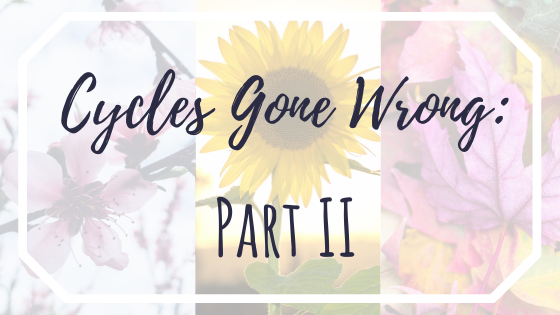In the last post we talked about what could go wrong during your period. This post we’ll look at the follicular/ovulation, and luteal phases of your cycle.
During the follicular phase a few things should be happening. First, your estrogen is rising along with your FSH. These hormones stimulate the ovaries to work on those eggs. Estrogen also stimulates your cervix to create fertile cervical mucus. As for symptoms during this time you should feel like you have plenty of energy throughout the day and should feel a little more social. You should also be producing some nice clear and stretchy cervical mucus. Symptoms that something is going on during this phase are not having any cervical mucus, if this phase lasts longer than day 21 or shorter than 5 days in your cycle, having mood swings, and headaches.

Not having any cervical mucus can be a sign of lack of estrogen. It could also be that you are short on quality Omega 6s or just dehydrated.
Mood swings and headaches are also typical symptoms of low estrogen.
If your follicular phase is too short this often indicates that your FSH and estrogen are out of balance with your LH. Most likely that your LH is too low. LH can be too low due to things like chronic stress or illness, or under nourishment.
Finally, if you have a follicular phase that’s too long that can be due to chronic issues or acute. If you have a one off longer cycle that’s not really a big deal and is often a result in a large stressor like travel, illness, or life event like a death or moving. However, if you have chronically long folicular phases or you just never get a period because you aren’t ovulating then this means there is something more serious going on with your hormones. Either you aren’t producing enough hormones which is typically due to under-eating (think calorie restriction, low fat diets, or just not getting enough nutritious foods) or over exercising. OR You have too many hormones going on like too much insulin because of blood sugar dysregulation, you have a condition like PCOS where you are producing too many androgens, or you have chronic inflammation which causes you to produce to much cortisol.
You usually have several follicles that are working on maturing at this time and when the time is right LH comes in and pop your most mature follicle spits out it’s egg. This is ovulation. The key player here is the LH and LH are most commonly out of whack in women with PCOS. When LH is too high all the time it makes it difficult for your body to create a proper LH surge. Another side effect of LH being too high is then having FSH be too low so your eggs don’t mature as quickly as they should so it takes longer for one to be ready. What causes LH to be too high? Typically, it’s excess insulin but it may be caused by other issues too like low FSH due to excess estrogen. Needless to say, it can get very complicated because it’s all interconnected.
Once you have ovulated you have moved into the Luteal phase of your cycle. During this phase it is natural to start feeling the need to slow down and have a little less energy during this time as your body winds down and gets ready for either pregnancy or your period (both of which take a lot of energy). Outside of somewhat lower energy and a possible need for less socialization you shouldn’t really have any other symptoms during your luteal phase. Symptoms that something is up with your luteal phase are: it’s shorter than 10 days or longer than 16 days, you have major mood swings, breast tenderness, bloating, carb cravings, headaches, acne, and/or sleep issues. Pretty much all of these symptoms are due to low progesterone, except for a long luteal phase. A long luteal phase (outside of pregnancy) may be a sign of a cyst, if your luteal phase continues longer than 18 days and you continue to get negative pregnancy tests you should definitely make an appointment to see your doctor to get it checked out.

What causes your progesterone to be low and thus the laundry list of PMS symptoms from above? So many things! The number one cause of low progesterone is stress but there are many other possible causes. It could be malnourishment, or a nutrient deficiency, it could be gut health issues, inflammation, blood sugar dysregulation, or thyroid issues. These symptoms could also be caused by estrogen dominance which can occur when your progesterone is too low but also if your estrogen is too high. Having excess estrogen is most often caused by stress, insufficient detoxification, and from environmental toxins.
Our cycles depend on a delicate balance of hormones and when there is something going on like stress, blood sugar regulation, gut health issues, or inflammation it shows in our cycles. So next time you have PMS symptoms or your period is “late” (really your ovulation was late) remember that your body isn’t broken or malfunctioning it’s telling you something is off. If you want to learn about what you can do to address these issues check out my Cycles Gone Wrong Part III post.

